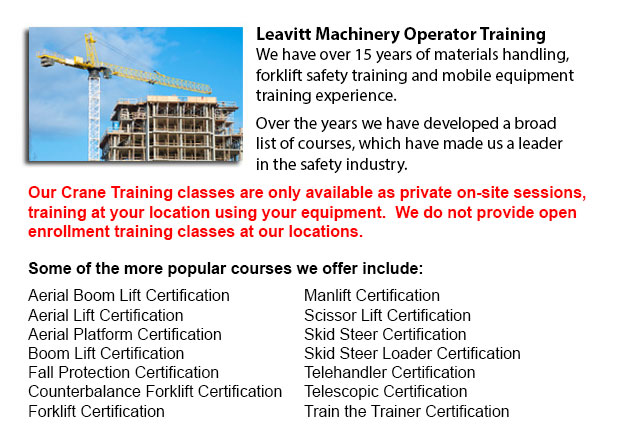
Crane Operator Certification Grande Prairie - The process to permit you to operate specific types of cranes is to take crane operator certification training to receive certification. The certification process incorporates hands-on practice, classroom learning and an ability assessment. A variety of training programs are offered for mobile cranes, overhead cranes, forklifts, boom trucks, tower cranes and other hoisting machines. Trainees will know the fundamentals of safety, equipment characteristics, and operational practices connected with these types of cranes.
Customized Practical Evaluation and Training:
The on-site practical training and evaluation can be customized by each company after the in-class session. At any time, two operators will be trained by an instructor. The length of time required for training will vary depending on the employer's levels of ability and machine type, but generally needs an hour or two. The training will concentrate on practical skills such as right rigging practices, safe operating procedures and planning the lift. Employers must schedule the on-site session ahead of time.
The training individual would receive an individual wallet certificate, whilst the company gets a wall certificate following finishing the in-class instruction, practical operating instruction and evaluation, and written examination. In order to to get certification, trainees need to have an 80 percent passing score on both practical and written tests.
The program consists of: Policies and regulations, instruction manuals; safety issues; dangers of high voltage; emergency rescue procedures; communications and signals; types, components, and terms; pre-operational inspection; crane capacity and configuration; pre-lift set-up and planning; wire rope and rigging; hammerhead / luffing jib crane operations; climbing cranes; fall protection; crane maintenance; CPR & First aid; and WHMIS.
The minimum basics for becoming an overhead crane operator consist of possessing the physical and mental capability needed to be able to do crane work. Essential capabilities consist of depth perception, normal field of vision, coordination, manual dexterity and reaction time. Potential operators must not have the tendency to become lightheaded. Operators who do not already have evidence of experience and qualifications need to achieve certification. Operators should be qualified in order to operate the particular kind of machine that they will be using to carry out their task.
-
Forklift Operator Certification Grande Prairie
Forklift Operator Certification Grande Prairie - Certification for forklifts are needed to ensure the safe utilization of forklifts for those employers in industrial, warehouse or construction environments. The training has to involve a method of edu... More -
Skid Steer Ticket Grande Prairie
Skid Steer Ticket Grande Prairie - On a skid-steer loader, the lift arms are beside the driver along with pivot points behind the driver's shoulders. This makes them different as opposed to a conventional front loader. Due to the operator's proximity... More -
Order Picker License Grande Prairie
Order Picker License Grande Prairie - Order preparation operation or order picking as it is more usually known is a method utilized in warehouse operations and consists of staff referred to as order pickers. The order picker's job is to take and coll... More -
Telehandler Certification Grande Prairie
Telehandler Certification Grande Prairie - Telehandler certification programs are both for operators who have some experience driving a typical forklift and for people with no experience. The real-world training provided by these programs produces gr... More -
Skid Steer Loader Training in Grande Prairie
The engine powered skid-steer loader consists of a small and rigid frame, equipped with lift arms which could attach to numerous industrial attachments and tools in order to perform various labor saving tasks. Typically, skid-steer loaders are four-w... More -
Crane Training School Grande Prairie
Crane Training School Grande Prairie - The crane training school offers industry-relevant programs. Courses provide trainees with learning results that match current industry demands. Our small class sizes combine theory and hand-on experience. Our q... More -
Telehandler License Grande Prairie
Telehandler License Grande Prairie - The telescopic handler or telehandler is a commonly used machine in agricultural and industrial applications. This equipment is similar in look to a forklift and even works in a similar manner, even though telehan... More -
Aerial Boom Lift Ticket Grande Prairie
Aerial Boom Lift Ticket Grande Prairie - Aerial lifts can be utilized to accomplish several unique tasks executed in hard to reach aerial spaces. A few of the odd jobs associated with this kind of lift include performing daily maintenance on structur... More

Forklift Training Grande Prairie
TOLL FREE: 1-888-254-6157
11205-98 Avenue
Grande Prairie, Alberta
forklifttraininggrandeprairie.com
Email Us
About Us



